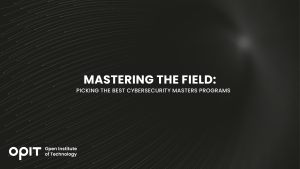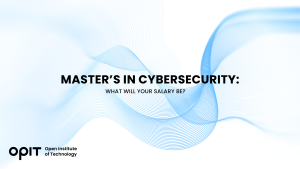Search inside The Magazine

Artificial Intelligence (AI) and machine learning are two of the fastest-growing emerging technologies right now. In late 2022, generative AI burst onto the tech scene in the shape of ChatGPT and its antecedents. However, that’s not the first time AI has made a major impact. In fact, the first AI chatbot, Eliza, was around in the 1960s.
Both AI and machine learning do far more than chat and research. AI is embedded in analytics, predictive forecasting, and monitoring for multiple industries. As the use of AI and machine learning expands, the need for professionals with relevant skills is also growing exponentially.
OPIT (Open Institute of Technology) provides top-tier education in various tech fields, including highly respected machine learning and artificial intelligence courses. Let’s take a look at these fascinating technologies and how the right AI machine learning course can elevate your tech career.
Understanding AI and Machine Learning
When you’re searching for courses on artificial intelligence and machine learning, it helps to have a basic definition for both terms. If you already work in the tech industry, you likely work with one or both of these technologies every day. Yet they’re often so embedded within systems or apps that you might not even realize.
AI refers to the computer’s to exhibit behavior that replicates human thought patterns. However, the details of this definition are a little more complex than that. “Computers” can mean anything from a small subsystem to a supercomputer. It can also mean your smartphone or an app. And, by emulating human behavior, experts don’t necessarily mean AI does things exactly like us. Truly “thinking” AI with genuine cognitive abilities is a long way off.
What AI actually does is take things humans can already do – and do it faster and more often. Think about a software DevOps team requiring automated monitoring and testing of code prior to deployment. AI can do this while checking for vulnerabilities and producing relevant, actionable reports. In healthcare, AI uses pattern recognition to diagnose diseases quickly.
Machine learning is a subset of AI. It focuses on using algorithms to consistently and continuously improve pattern recognition for AI that appears to “learn.”
Courses in AI and machine learning are so popular because of the inherent usefulness of these technologies. Learning these skills now is a way to future-proof your tech career.
The Best AI and Machine Learning Courses
Numerous artificial intelligence and machine learning courses cover different topics and niches. You may choose to learn in a classroom setting or remotely. Some courses are short-term, generally covering foundational aspects of AI. Others carry on over several months for a deeper learning experience. Always consider how the course you invest in will impact your career advancement opportunities.
Absolute beginners may benefit from the Coursera IBM Applied Professional Certificate. This course runs entirely online over three months, presuming you can commit to 10 hours a week. Students learn the basics of AI, particularly how it powers IBM’s Watson AI services.
Oxford Online runs a 6-week online AI program course requiring 7-10 hours of commitment a week. This course looks at AI concepts and business cases for implementation and takes a glimpse at the future of AI.
For classroom-based courses on AI and machine learning, prospective students are best placed to contact local educational institutions. Offline courses vary in length, depth, and usefulness, so always check the syllabus and what certification you gain. It’s worth considering how far you’ll have to travel to gain a qualification.
One of the biggest challenges with AI is making it ethical. OPIT addresses that head-on with the MSc in Responsible AI. Learn advanced AI skills while keeping inclusivity and human interest at the heart of every aspect of the syllabus.
OPIT also offers other courses that consider the impact AI has on modern business practice. Undergraduates could consider the BSc in Digital Business, which includes a full Introduction to AI segment. There are also elective topics, including AI-Driven Software Development.
The Structure of AI and Machine Learning Courses
What should you expect from the best courses on AI and machine learning? Each course has a specific length, either in terms of study hours or a set deadline date. Most online courses have a specific intake date to make sure students get the right support at the right time.
Once you start your machine learning and AI course, you can expect a good balance between theory and practical application. For example, OPIT’s master’s degree course starts with foundational theory and critical thinking around ethics in AI. From here, students get to handle complex data sets. They program in Python and learn how to design effective AI-powered data pipelines.
The structure of your course will depend on the focus, but to give you the best foundation, courses may follow a similar pathway to this:
- Basics of AI, including the differences between AI and machine learning
- Discovering applications of AI — these may be general or industry-specific, depending on the nature of your course
- Data collation, analysis, and visualization
- Programming for AI
- Natural language processing (NLP) and natural language generation (NLG)
- Removing or preventing bias in AI training
Some courses will also offer advanced elective programs, such as understanding AI within the sphere of FinOps (financial operations) or business strategy. If you have a particular industry you’re hoping to excel in, look out for courses with topics that could help you further those ambitions.
Online AI and Machine Learning Courses: Flexibility and Accessibility
Choosing one of the best machine learning and AI courses to do online offers more benefits than new skills. Online learning allows you to study in your preferred environment and at your own pace. You just need to make sure you keep an eye on set deadlines.
You’re not distracted by a class full of people, but you still have access to tutors and support. Many open learning institutes have online communities of students. These are great for preventing isolation and gaining advice.
As a tech professional, the ability to set your own study schedule is essential. Online AI and machine learning courses provide flexibility, allowing you to learn as you work. With OPIT’s Master’s Degree in Responsible Artificial Intelligence, you could potentially have an MSc in 12-18 months without taking any time off work.
Key Skills Gained from AI and Machine Learning Courses
When choosing your online course on AI and machine learning, consider the skills you’ll learn. You should expect to cover:
- Data preprocessing
- Data cleansing
- Data visualization and storytelling
- Linear and nonlinear dimensionality reduction
- Manifold learning
- Human-centered AI design
- Language-agnostic AI programming skills
An MSc in AI and machine learning provides specialized skills and knowledge that you can use to address complex AI challenges in just about any industry.
Choosing the Right AI and Machine Learning Course for You
Picking the right AI and machine learning course is simpler when you consider your goals. Do you want a quick upskill and insight into emerging technologies? Or do you want an immersive course that empowers you to take on new career challenges? Most AI and machine learning courses will provide guidance on the type of career students could hope to pursue after completion.
Always look at the syllabus of a course and see if it meets your personal goals. If you’re unsure about any aspects, contact the education provider for more information.
OPIT’S MSc in Responsible Artificial Intelligence: An Overview
If you’ve decided an online AI and machine learning course is for you, as a graduate, an MSc is the natural choice. The next intake for the OPIT MSc in Responsible AI is September 2024, and details on how to apply are online.
What are the benefits of taking this course?
- A fast-track option to gain your master’s degree in just 12 months
- Fully inclusive fees — no hidden charges
- Various scholarship and funding options
- Availability of early-bird discounts
- Access to academic leaders from all over the world
- Education with an EU-accredited institution
Your MSc course covers every aspect of AI you might require for a career in AI and machine learning. Topics start with AI and ethics and quickly move into human-centered design, computer vision, and how AI impacts IoT and automation.
As you move into your final term, you start your MSc thesis, which focuses on AI projects with industrial relevance. There’s also the opportunity to pursue an internship to complement your thesis and gain vital experience.
AI and Machine Learning Courses for a Future-Proof Career
AI is now part of most growing industries, from property and real estate to healthcare and social care. Tech professionals have the opportunity to upskill themselves and move into fields that they have a real passion for. Organizations are looking for and willing to pay high salaries for knowledgeable, qualified AI experts.
Taking the time now to embark on machine learning and AI courses could speed your journey along your chosen career trajectory.

Written on March 21st 2024
Source here: Les Echos Solutions
According to the UN, a cyber attack takes place every 39 seconds! Faced with this omnipresent threat, training in cybersecurity is essential. Whether to master IT security strategies or to manage the digital transformation of your company, OPIT’s programs are adapted to the needs of companies. The Open Institute of Technology offers an innovative range of Bachelor’s and Master’s programs, specially designed to meet the challenges of digital business and cybersecurity. Focus on the different programs that are offered.
The current context of Cybersecurity
In recent years, the CESIN (Club des Experts de la Sécurité de l’Information et du Numérique) cybersecurity barometer has revealed alarming trends. Half of businesses were victims of at least one cyberattack in 2023, compared to a slightly lower rate (45%) the previous year.
The consequences of these cyber attacks are far from negligible. They lead to significant financial losses and an erosion of customer confidence. According to a study carried out by the consulting firm Asterès, the cost of successful cyberattacks on organizations in France reached 2 billion euros in 2022. An average of 58,600 euros per attack!
Investing in specialized training then becomes an essential step to secure the future of your business. A Master’s degree in cybersecurity allows you not only to understand risks, but also to develop effective strategies to anticipate, detect and react effectively to cyber threats.
The digital transformation of businesses
The digital transformation of businesses is an essential process in the contemporary economy. This phenomenon, accelerated by the Covid-19 pandemic, involves the integration of digital technologies in order to improve efficiency, productivity and customer value.
To stay in pole position, you must be able to anticipate trends, continually innovate and adopt a digital-first approach.
It is precisely in this context that a Master’s degree in digital business proves relevant. This program teaches you how to integrate digital technologies strategically and develop new business models to create added value for both your customers and your company.
Programs designed according to your needs
OPIT, for example, offers specialized programs in Cybersecurity and Digital Business, tailor-made to meet the contemporary challenges of the business world. The goal is to help you propel your business to the forefront of innovation and technology while protecting it:
- MSc in Enterprise Cybersecurity: This advanced program is specifically designed to train you in IT security. By integrating a multidisciplinary approach, this master’s degree in cybersecurity explores in depth risk management strategies, advanced cryptography techniques, as well as best practices in information systems security. This program allows you to acquire the skills necessary to effectively protect your company’s data and systems against cyber threats.
- MSc in Applied Digital Business: This program is a gateway to the digital transformation of your business. This master’s degree in digital business is mainly focused on the synergies between technology and business strategies. By exploring the twists and turns of digitalization, this program offers to you a precise vision of emerging trends, innovative business models, and the best strategies to guarantee the competitiveness of your company.
Additional bachelor’s and master’s programs to strengthen your expertise
Beyond courses in Cybersecurity and Digital Business, there are other programs on the market to allow you to develop multidimensional expertise:
● BSc in Digital Business: This bachelor’s program serves as a foundation to the Master’s level to teach you how to merge business acumen and digital fluency, focusing on digital strategies and innovation.
● BSc in Modern Computer Science: This is a program that provides foundational skills, both theoretical and practical, in all aspects of modern computing.
● MSc in Responsible Artificial Intelligence: This program teaches you the techniques for developing and using Artificial Intelligence in an ethical and sustainable way.
● MSc in Applied Data Science: This master’s degree covers business fundamentals, data science, machine learning, artificial intelligence and problem solving.
Online courses: combining professional responsibilities and learning
“The programs of OPIT (Open Institute of Technology), an institution based in Malta, are accessible 100% online. This approach allows you to enrich your skills without interrupting your career or the development of your business. You learn at your own pace, while honoring your professional responsibilities”, indicates one of the managers of the organization.
This learning method also allows the practical application of the knowledge acquired in the professional context.
“OPIT training courses provide a solid foundation for navigating the complex landscape of cybersecurity and digital business. Thanks to comprehensive, innovative study programs adapted to current challenges, you will strengthen your leadership while securing your business”, he specifies.
To find out more: https://www.opit.com/

By Open Institute of Technology, March 12th 2024
Source here: EuropaPress
OPIT – Open Institute of Technology, an online higher education institution recognized for its innovation and quality, has recently announced the inclusion of new online Master’s degrees. These programs are focused on the practical and theoretical application of emerging technologies, particularly Artificial Intelligence (AI). This initiative provides students with a comprehensive vision of the latest trends, facilitating their insertion into various disciplines linked to the digital world.
Important to highlight is that OPIT is accredited under the prestigious European Qualifications Framework (EQF), ensuring that its study programs, such as the Master’s in Responsible AI and the Master’s in Applied Data Science and AI comply with European educational quality standards. These accreditations not only validate OPIT’s academic excellence, but also ensure that the degrees obtained are recognized and respected internationally, opening doors to job opportunities around the world.
New growth opportunities in the digital environment
The contemporary work landscape demands more and more specialists in Information and Communication Technologies (ICT), driven by the digitalization of all sectors. ICT experts are essential to innovate, manage complex infrastructures and face current challenges such as Cybersecurity and AI. Having specific specialization in these areas creates diverse career opportunities and competitive rewards, as the ICT specialists contribute to innovation and technological development.
OPIT – Open Institute of Technology offers a complete educational experience, immersing students in the world of ICT and Technology. The Institute has developed Bachelor’s and Master’s programs in key areas of the ICT sector, such as Modern Computer Science, Responsible Artificial Intelligence, Enterprise Cybersecurity and Applied Data Science and AI. These programs are designed to provide not only a solid theoretical foundation, but also practical skils that are highly demanded in the job market.
Intensive Master’s degrees in Cybersecurity and Artificial Intelligence
Cybersecurity is essential to protect our digital infrastructures from increasingly sophisticated threats. OPIT has launched a Master’s degree in Enterprise Cybersecurity that prepares students to implement effective security solutions and lead Cybersecurity initiatives in any environment. This program, like the rest of those offered by OPIT, is accredited according to international standards, which ensures that the knowledge and skills acquired are relevant and applicable globally.
The connection between Cybersecurity and AI is essential to develop a comprehensive understanding of today’s security challenges. OPIT offers a Master’s degree in Artificial Intelligence that integrates the technique with ethical considerations, preparing students to lead at the technological forefront. This knowledge allows us to anticipate and proactively respond to emerging threats, guaranteeing the protection of digital assets in an increasingly complex and dynamic environment. In this sense, OPIT – Open Institute of Technology has perfectly understood the need of the current labor market by offering a training program better known as a Master’s degree in Artificial Intelligence. The program combines a technical approach with the ethics of AI and its advanced aspects and covers fields such as Natural Language Processing, Computer Vision, Sensor Systems and Automation in Industry.
OPIT is a leader in the education of digital and technological disciplines, offering programs that combine theory and practice. Students find in these programs an opportunity to expand their horizons and prepare to contribute significantly to their fields of expertise.
For more details about the accreditation and internation recognition of our programs, visit our website: https://www.opit.com/.

The Artificial Intelligence revolution is now a reality, and the recent appointment of Father Paolo Benanti, a member of the United Nations Committee on Artificial Intelligence, as Chairman of the AI Commission for Information, underlines the importance of addressing this transformation in a conscious way.
The mission today, and with OPIT – Open Institute of Technology we are going in this direction, is to guarantee for the new generations the opportunity to become aware and responsible in facing change. It is precisely for this reason that we have integrated AI into our educational offer, applying it in a transversal way and with different cuts, and our Master in Responsible AI is just one example. In this article from La Stampa, I write my thoughts on the crucial role that AI can play in the higher education sector, where ethics and philosophy will be central elements in the development and use of this technology.
By Francesco Profumo, January 31st 2024
Source here: LinkedIn
Full article available on La Stampa (in Italian)

Malicious attacks on IT systems and devices are increasing in complexity and organizations need to be proactive and agile to deal with ever-evolving threats. These threats vary from ransomware attacks and the installation of malware to password theft and phishing.
Organizations want the best of the best when it comes to senior cybersecurity professionals, and demand is growing. In an increasingly competitive job market, those who have graduated from the best cybersecurity master’s programs (such as OPIT’s MSc in Enterprise Cybersecurity) will stand out from the crowd.
Exploring Cybersecurity Programs
The ever-evolving nature of threats makes a career in cybersecurity one of the most exciting in the field of IT. However, the applicant must have suitable qualifications to secure a place at a leading company.
The right program should incorporate advanced master’s level theoretical subjects and practical, experiential learning, and the courses on offer should be at the cutting edge of cybersecurity best practices. This will provide the students with the tools they need to deal with not only current cybersecurity challenges but also emerging threats.
Each qualification has core courses allowing students to choose which competencies would best fit their unique requirements. This makes deciding on the best qualification from the best cybersecurity master’s programs essential.
Criteria for the Best Cybersecurity Programs
When evaluating qualification options, it will soon become clear that the best cybersecurity programs have much to offer. But how do you assess whether your chosen program will deliver the goods regarding career opportunities?
When researching the best cybersecurity master’s programs, keep the following criteria in mind:
- Ensure that the master’s program you choose has course content applicable to your specialty and aligns with other industry certifications you may already have.
- Check if your selected qualification offers courses that balance theory with real-world application.
- Verify that the qualification provider is accredited by an internationally recognized regulatory or accreditation body.
- Make sure the program offers a flexible online study schedule.
Aside from the course offerings, services such as networking opportunities, career advisory, and post-graduate support will be invaluable for job placement opportunities – particularly institutions in partnership with leading cybersecurity firms.
Researching alumni success stories will also give you a unique insight into the program beyond the program’s overview and curriculum.
Best Cybersecurity Masters in the World
Cyber threats are global; they don’t respect borders. In light of this, the best cybersecurity masters in the world will offer a range of internationally accepted coursework, providing skills based on diverse perspectives. This is the program for those who want to build a robust network of business contacts.
Here are five top cybersecurity programs that tick all the boxes:
1. M.S. in Cybersecurity From the University of Tampa – Sykes College of Business
This program may be a good fit for those with an ever-changing schedule because they can study full-time or part-time. However, due to its flexibility, the on-campus degree will take between one and two years to complete. One of its key features is preparation for professional certifications such as the Certified Information Systems Security Professional (CISSP) exam. The program costs approximately $20,960 (about 19,380 euros) per annum.
2. Master of Science in Cybersecurity Management – Nova Southeastern University
Students will devote between one and two years to this qualification, with a mixture of distance learning and on-campus study. Fees are $950 (around 878 euros) per credit. The program focuses on vital skills such as, cybersecurity management communication, organizational policy development, compliance issue management, and risk management principles application to the real-world environment.
3. MSc in Cybersecurity and Public Policy – Tufts University School of Engineering
Coursework for this exceptional master’s qualification takes place entirely on campus, and student fees are $1,730 (approximately 1,600 euros) per credit. Students have the flexibility to complete the coursework in either one or two years. Core coursework includes privacy in the digital age, how systems work and fail, and the role of cyber in the civil sector. This course is ideal for students who want to get on the fast track to a senior management position.
4. UC Berkeley Master’s in Cybersecurity Online
This online qualification is ideal for busy professionals who may find full-time on-campus study problematic, with completion occurring in as little as 20 months. The program allows students to master foundational cybersecurity-related technical skills and speak with authority on the political, business, and legal complexities of the ever-evolving cybersecurity environment.
5. Information Technology Auditing and Cyber Security MS – Temple University Fox School of Business
As another fairly flexible program on the list, this on-campus two-year qualification can be completed full-time or part-time. The program is hands-on, with coursework delivered by industry-level experts. Students learn how to assess business needs and design the internal processes that are so important for the development of robust cybersecurity systems. The course (costing $1,165 or 1,077 euros per credit) is ideal for employment in accounting and consulting firms, computer software and hardware companies, and financial institutions.
Best Online Cybersecurity Master’s
Given the increasing cybersecurity threats that are now a business reality, the best online cybersecurity master’s degrees are in increasing demand. Accordingly, many businesses consider a qualification like this essential for senior management.
Online master’s degrees are an attractive option for the busy executive or someone searching for the ideal work/life balance. They provide accessible, interactive access to state-of-the-art digital platforms that can make studying at your own pace a pleasure. The best cybersecurity master’s programs also offer a combination of theoretical foundations and hands-on experience, all delivered remotely.
Learn more about your options for further online study by clicking on this link: best online cybersecurity programs.
OPIT’s Master’s in Enterprise Cybersecurity: A Cut Above the Rest
The Master’s Degree (MSc) in Enterprise Cybersecurity from OPIT is not only accredited but also conforms to the criteria that elevate a qualification above the standard offerings. Especially notable is the prioritization of real-time industry needs, making it the best cybersecurity master’s degree to obtain. The coursework is the ideal combination of theoretical approaches and real-world experience, all delivered via a platform that is not only easily accessible but also intuitive to use.
Enrolling in the best online cybersecurity master’s, like that from OPIT, ensures students can study at their own pace while learning from industry expert faculty members. The 12–18-month qualification is also recognized by key industry players, future-proofing cybersecurity leaders with the knowledge to implement cutting-edge security solutions and lead world-class cybersecurity initiatives.
Best Cybersecurity Master’s Programs in the USA
The United States is at the epicenter of cybersecurity innovation. This is no coincidence, as it’s home to Silicon Valley and numerous global giants in the tech industry. The demand for qualified degree holders is growing exponentially, but, once again, selecting from the top cybersecurity master’s programs in the USA can be a daunting task. Here are two well-respected options.
1. Online Master’s in Cybersecurity – Syracuse University
Live online classes and coursework that provide professionals with the knowledge required to identify, prevent, and counteract cybercrime make this master’s program one of the best cybersecurity masters programs. The program features cutting-edge research and multidisciplinary collaboration.
2. Master of Science in Cybersecurity – Marshall University
This program is ideal for students who want to pursue a Ph.D. or those who want to reach the pinnacle of their chosen profession. The curriculum covers advanced topics such as cryptography, cybersecurity policy, cyber risk and vulnerability assessment, cyber operation, and software security (among others).
Future-Proof Your Career With OPIT
The most advanced and best cybersecurity master’s programs will equip busy professionals with the specialized skills and knowledge required to thrive in an ever more competitive job market.
Online degrees such as the OPIT Master’s in Enterprise Cybersecurity should be on the bucket list of any aspirant cybersecurity expert. Dominate the field and make significant contributions to the evolution of cybersecurity best practices with OPIT‘s exemplary program.

According to Statista, close to 85% of people in the EU use the Internet daily. That’s a huge population that demands a working digital infrastructure and expects online services to function seamlessly. This has resulted in extreme demands for digitizing online services across industries and sectors, with seven of the 10 most prominent companies in the world focusing on digital platforms. The process has been dubbed the Fourth Industrial Revolution.
With the advent of digital-first business accelerated by the COVID-19 pandemic, many companies are seeking experts in digital transformation to adapt to new practices. These positions are highly sought after and compensated accordingly, with the average yearly salary for digital transformation experts in Germany being €96K. In the U.S., similar positions can pay up to $200K per year.
That’s where the best online master’s degrees in digital transformation come in. Outfitted with future-proof knowledge and practices, you, too, can lead companies in making these pivotal changes. What’s important is to choose the best programs—like the one from OPIT—to give you the necessary edge and expertise in this forward-facing career.
Understanding the Value of Online Education in Digital Transformation
At its core, digital transformation is firmly entrenched in technology use and relies on many principles brought out by rapid globalization. All industries rely on technology and digital systems in one way or another, whether those are services, sales, marketing, or even production. And technology is changing more quickly than the educational systems can keep up.
With online education, the curriculum can adapt to the most recent advancements in the industries, from optimized data tracking to AI use. It allows direct access and a deeper dive into the same platforms you’ll be using during practical work. The basic practices you learn during an online curriculum can be immediately applied to real-life work and extrapolated onto custom projects in your career.
Furthermore, online teaching evens out educational opportunities across the globe. So long as you have an internet connection, you can access world-class education piloted by leaders regardless of the institution you wish to enroll in.
Online learning also allows you to set your own learning pace. It’s an excellent option if you’re already a career professional who wants to be more aligned with the needs of the modern world while still working full-time or providing for your family.
What to Look For in Top Online Digital Transformation Programs
With so many online and offline teaching programs that promise state-of-the-art education in digital transformation, it can be extremely challenging to find the best options. Here’s what you should look for in your digital transformation degree or course:
- Curriculum relevance: Digital transformation combines data science, management, and analysis and how technology affects businesses and entrepreneurs, which should be must-haves in the program. Also, look for classes that focus on engineering, finance, project or product management, and marketing.
- Innovative teaching: Due to the subject’s inherent reliance on available technology, opt for programs that have interactive tests, simulations of real-life events and platforms, and real-world practice projects.
- Industry partnerships: Look for programs supported by leading digital-first companies or those that provide internships and real-life projects as part of the dissertation.
- Accreditation: Find programs that are accepted as fully accredited Higher Education Institutions, such as the European Qualifications Framework (EQF), EAHEA, EQUIS, AMBA, and AACSB, or a member of an international body such as ENQA. It will ensure your degree is universally accepted.
- One-on-one teaching: Apart from traditional group teaching, look for courses that allow for dedicated one-on-one supplemental teaching and mentorship.
- Modern concepts: The course doesn’t need to teach just the theory of the currently dominant technologies and practices but also set up future concepts and teach a theoretical basis that accounts for future advancements.
Best Online Masters in Digital Transformation
Here are the top five options for your online digital transformation degree.
OPIT’s MSc in Applied Digital Business
Developed by industry leaders from modern educational institutions and leading companies such as Amazon, the EQF-accredited Open Institute of Technology has built the 18-month course in Applied Digital Business from the ground up. As a result, the course aims to train students for careers in digital transformation, data science, marketing, and business analysis. Due to its online-first nature, the course immerses you into the digital management sphere from the get-go, guiding you via a combination of theoretical analysis and practical projects.
In the first term, the program provides a detailed post-graduate education in data science, digital project management, problem-solving in the digital era, and customer value management analysis. In the second term, the course focuses on digital transformation, platform, and project management, as well as finance in the digital-driven economy. Finally, the course ends with a long-term research capstone project to consolidate your skills with full support from a faculty mentor.
It’s one of the most versatile programs available that will allow you to transfer your existing skills into modern practices and create opportunities for growth in both current and emerging industries. With support from global industry leaders, you get access to a wide network of peers to set you up for success.
University of Hull Online – MSc in Digital Transformation
This is a focused 2-year program in digital transformation, teaching the relevance of emerging technologies in modern digital systems, such as AI, blockchain, 3D printing, and quantum computing. However, the curriculum also contains subjects that touch on information and project management, how customers affect digital businesses, and digital innovation and strategy development. The program is fully online with a part-time commitment and optional group webinars, with the University of Hull accredited by AMBA.
University of Edinburgh Online – MSc in Digital Education
While not a focused master’s degree in digital transformation, this degree in digital education provides a well-rounded theoretical basis for working in the digital sphere. It focuses on how digitization will affect education, making it a lucrative choice for people employed in academia who want to future-proof their skills. It lasts from two to six years of part-time online study, and the university is currently ranked among the top 20 in the world.
ESSCA Online Campus – MSc in International Business 4.0 – Leading Green & Digital Transformation
ESSCA Online is a triple-accredited online school that teaches international business practices, digital transformation techniques, and sustainable operation management. It also provides an overview of blockchain, Web3, the metaverse, project management, fintech, and data analysis. It’s a 12- or 24-month program with case study programs and consulting projects with companies affiliated with ESSCA.
University of South Wales – MSc in Leading Digital Transformation
This degree course focuses on leadership, digital technologies, and innovation in the digital field, with a particular focus on the healthcare sector. However, it also teaches UX design, management within digital-only teams, and agile business practices. The program lasts for two years of part-time study (half a day each week) and is delivered through online real-time courses with guests from leading companies.
Why Opt for OPIT’s Digital Transformation Education Online
Traditional university programs commonly use the same in-person curriculum and just deliver the content online. However, OPIT’s education system is fully tuned towards online learning. You get to interact with lecturers worldwide and learn from industry leaders in real-time or on-demand. The program combines theoretical knowledge on modern topics with practical exams and assignments that put it to the test to ensure it sticks.
OPIT’s curriculum is also designed to be future-proof. The skills you learn in the master’s degree for digital transformation will be useful in solving future challenges with yet-to-be-conceived technology. It ensures that your career can last for years with minimal re-skilling and creates a path of lifetime improvement through practice.
Start Your Digital Transformation Journey
Earning a post-graduate degree in emerging technologies and concepts can push you forward as an expert for years to come. Choose OPIT as one of the best online digital transformation degree options and receive a stellar combination of theory and practice to provide you with real-world skills crucial for career development.

Cyberthreats keep evolving at an unprecedented rate, affecting critical digital infrastructure across industries. Worst of all? No one’s safe. Not healthcare providers, not financial institutions, and not even government agencies. That’s why it shouldn’t be surprising that the demand for cybersecurity professionals is also unprecedented, with over 347,000 positions waiting to be filled throughout Europe.
Naturally, such high demand comes with competitive salaries for highly trained and educated individuals. So, if you’re pursuing a master’s degree in cyber security, salary expectations are undoubtedly promising, often reaching six figures.
In other words, investing in a master’s degree in cyber security is investing in a financially secure future.
But just how secure will this future be? Keep reading to learn what the master’s in cybersecurity salary expectations are.
How Much Can I Make With a Master’s in Cybersecurity?
Given how desperately companies need qualified cybersecurity professionals, they do their best to make their offers as attractive as possible. That’s why the average salary for a master’s degree in cyber security is roughly €73,000 a year.
In the U.S., the situation is even better, with the average salary as high as $132,962 (around €123,000) a year. This is great news, as virtually all cybersecurity job positions can be done fully remotely.
As for a salary range, top earners make over €100,000 a year in countries like Luxembourg, Belgium, and Switzerland. Entry-level positions typically start at €30,000. This discrepancy clearly shows that years of experience play a significant role in determining the cybersecurity master’s salary. But this factor is far from the only one.
The location of the job, the specific industry (private or public sector), and the level of responsibility also heavily influence compensation in the cybersecurity field.
With these elements, the math is simple. Countries with higher demand for cybersecurity professionals (e.g., Germany) will generally offer higher salaries. The same goes for industries, such as finance and technology, which pay better than government jobs. But what about the level of responsibility? How does your cybersecurity role affect your salary?
The good news is that those who hold a master’s degree can earn a six-figure salary even if they aren’t in a leadership position. Let’s break down the average master’s in cyber security salary expectations for the most common roles in cybersecurity.
- Information security analyst: €100,000
- Cybersecurity manager: €105,000
- Cybersecurity engineer: €125,000
- Incident response manager: €125,000
- Penetration and vulnerability tester: €125,000
- Cybersecurity consultant: €140,000
Can I Make 200k a Year in Cybersecurity?
If you’re looking for a yes or no answer, it’s yes, you can make €200,000 a year in cybersecurity. But since this figure is missing from the median salaries shown in the previous section, you can probably conclude that a €200,000 yearly salary isn’t the norm for every cybersecurity professional.
So, what does it take to earn this impressive figure?
The “easiest” way to such a high cybersecurity master’s degree salary is through a leadership position. For instance, Chief Information Security Officers (CISOs) are all but guaranteed a salary over €200,000, even when working in mid-sized companies. The same goes for the lead software security engineer.
Another factor that can contribute to such a lucrative pay is location. Working for a U.S. company in a high-demand area is more likely to get you your desired salary. For instance, for New York City and Los Angeles master’s in cyber security jobs, salary often reaches €200,000 due to a high demand for skilled cybersecurity professionals.
Finally, specialized roles that call for niche expertise, such as application security engineer, can also command a €200,000 salary.
As you can see, all the highest-paid positions require a Master of Science in cybersecurity. Salary expectations for a Bachelor of Science and other lower-level certifications in cybersecurity usually fail to hit the €200,000 mark.
Can You Make 500k a Year in Cybersecurity?
Again, the short answer is yes, you can make €500,000 a year in cybersecurity. But keep in mind that this salary is reserved only for exceptional scenarios and individuals, such as the following:
- Cybersecurity professionals in extremely niche expertise areas (e.g., disaster recovery and application security)
- Leadership roles within large multinationals or Fortune 500 corporations
- Cybersecurity consultants for high-end clients
- Entrepreneurs working on cybersecurity solutions and products
The Investment in Education vs. Return on Salary
There’s no doubt about it – cybersecurity is a highly lucrative field. But to earn the highest possible salary in the field, you’ll need one of the highest degrees of education – a master’s degree. Of course, this degree won’t be affordable if you want it to come from a highly reputable institution. So, is a master’s degree in cybersecurity even worth it?
The answer is a resounding yes!
Let’s do the math.
The simplest 10-year return-on-investment (ROI) calculation looks like this:
(expected annual salary post-master’s x 10) – (annual salary pre-master’s x 10) – (the total tuition for the master’s degree)
Let’s say you’re pre-master’s annual salary is €30,000 and your goal post-degree is a €75,000 salary. For tuition, we’ll use €6,750, which is the cost of the highly coveted Master’s Degree in Enterprise Cybersecurity at the Open Institute of Technology (OPIT.)
After crunching the numbers, you’ll see that the ROI from a cybersecurity master’s from OPIT is over €440,000.
That’s not to mention all the possibilities for advancement within the field and the possibility of working for U.S. companies, which are known to pay significantly more than most European companies.
OPIT’s Master’s Degree (MSc) in Enterprise Cybersecurity: Positioning for High Salaries
The potential ROI from an OPIT master’s degree is a reason enough to pursue a Master’s Degree in Enterprise Cybersecurity. Still, let’s explore how this reputable institution positions its students for such high salaries.
At OPIT, you won’t just work on your technical skills. You’ll also acquire a lot of valuable managerial expertise that allows you to pursue a variety of high-paying roles within the cybersecurity landscape. After all, you can’t get to the CISO position without mastering the intersection of technology and management.
On top of this perfect blend of knowledge, OPIT gives you a chance to gain real-world project experience while studying. This means that you’ll be ready to take on virtually any role in cybersecurity from day one. No extensive training needed!
Here are just some of the roles an OPIT master’s degree can prepare you for:
- CISO
- Cybersecurity director
- Security solutions architect
- Cybersecurity risk analyst
- Incident response manager
- Cybersecurity compliance officer
Aim for Long-Term Success
With a master’s degree in cyber security, salary expectations rise beyond the industry average, which is already more than competitive. Of course, this degree should come from a prestigious institution like OPIT. Why? This is the only way to achieve top-tier salary benchmarks wherever you end up working.
So, if you’re looking for a long-term career that offers financial stability and growth, don’t think twice about applying for OPIT.

Data is the digital powerhouse, and data science is the driving force behind it. It’s a tool for uncovering stories hidden in data, predicting the future, and making smart decisions that shape industries. So, what can you do with a data science degree? A whole lot, it turns out. Let’s find out more.
Exploring Career Paths with a Data Science Degree:
The demand for data-savvy professionals is skyrocketing across various sectors. Let’s break down the “who’s who” in data science and see where you could fit in.
- As a data scientist, you’re at the forefront of unearthing insights from a mass of data. Day to day, you will build predictive models and algorithms and drive strategic decisions.
- The machine learning engineer role means you develop systems that learn from data and improve themselves without human intervention: smart algorithms that predict user behavior, automate tasks, and even drive cars.
- Data analysts turn data into easily understandable insights. Their toolkit includes statistical analysis, data visualization, and a knack for spotting trends for informed decision-making.
- As a business intelligence analyst, you bridge data and strategy to help organizations make smarter decisions through data. This involves analyzing market trends, monitoring competition, and creating dashboards of the company’s performance.
All this is just scratching the surface. When pondering “what jobs can you get with a data science degree,” there’s nearly limitless potential. With a data science degree, you could work anywhere from tech giants and finance firms to healthcare organizations and government agencies. For just a few examples, you could predict the financial trends and outcomes of a healthcare initiative or follow student progress in an educational institution.
Is a Data Science Degree Worth It?
A data science degree opens pathways to various industries, like online marketing, finances, environment, or entertainment. Clearly, data is everywhere, and so is the demand for those who can understand and manipulate it.
With how widely applicable data science is, salary potential is unsurprisingly vast. It’s a field where six-figure salaries are the norm, not the exception. The median annual wage for data scientist is £59,582 per year in London, and around €78,646 in Berlin. And that’s just the median—many data scientists earn significantly more, especially as they gain experience in high-demand areas.
The demand for data professionals is through the roof. Every company tries to become more data-driven and needs people who can analyze, interpret, and leverage data. This demand translates to job security and plenty of opportunities to advance your career.
Personal growth is another massive perk. Data science is in a permanent flux, which means you’re always learning. New programming languages, machine learning algorithms, or ways to visualize data are being introduced to put you on the cutting edge of tech.
Employment for data scientists might soar by 35% from 2022 to 2032, with an average of 17,700 job openings each year, a much faster growth than the average. Salaries range impressively from $95,000 to $250,000 when expressed in USD.
What to Do With a Data Science Degree Beyond Traditional Paths:
Here are some thought-provoking directions for what to do with a data science degree.
Entrepreneurship
Data science acumen can see you launching startups that use big data. Perhaps you could build apps that predict consumer behavior or platforms that personalize education. Your ability to extract insights from data can identify untapped markets or create entirely new service categories.
Consultancy
As a consultant, you can be the beacon of wisdom for businesses across the spectrum. Your know-how could create a more optimal retail supply chain, mitigate financial risks for a bank, or measure the impact of a nonprofit’s programs.
Positions in Non-Tech Industries
Data science is infiltrating every corner of the economy. You can use data to improve manufacturing, make hospital conditions better for patients, optimize crop yields in agriculture, or contribute to saving the environment by following emission trends. Your skills could lead to breakthroughs in sustainability, quality of life, and more.
Cross-Disciplinary
The intersection of data science with other fields opens up exciting new roles. Consider a career as a digital humanities researcher, where you apply data analysis to uncover trends in literature, art, or history. Or perhaps you could become a legal tech consultant who predicts trial outcomes or analyzes legal documents. Data science collaborating with other disciplines can lead to entirely new fields of study.
Navigating the Intersection: Data Science and Cybersecurity
Data science’s knack for sifting through mountains of data to uncover hidden patterns or predict future threats complements cybersecurity’s focus on protecting these insights and the systems that house them. Therefore, you might have a dual focus: using analytical techniques for data security and applying security principles to protect data integrity. The synergy bolsters defense mechanisms and makes data analysis more sophisticated and broader.
OPIT’s Distinctive Educational Offerings
Studying online makes sense – it’s flexible so you can learn at your own pace, and lets you connect with peers and experts from all over the world. It’s also much more accessible and affordable than traditional education. Starting with the Bachelor’s Degree (BSc) in Modern Computer Science, OPIT gives you a solid foundation to make a mark in data science. This program covers the essentials—programming, software development, databases, and cybersecurity. It’s equally valuable to professionals to boost their skills as well as fresh high school graduates who want a future in computer science.
Furthermore, OPIT’s Master’s Degrees (MSc) in Applied Digital Business and Applied Data Science and AI bring together the business and technology of the future now. These programs reveal the symbiosis between tech and business. Students spearhead digital strategies, manage digital products, and navigate digital finance. In an economy increasingly defined by digital interactions, these degrees prepare you to be at the forefront.
OPIT, as your educational partner, combines career-aligned curricula, flexible studying, creative testing, and the chance to connect to top-dog industry experts.
Data Science Is a Door Opener
Let’s recap the question: “Is a data science degree worth it?” With a data science degree from OPIT, the career paths you take are promising, no matter where you go. If your passion lies in crunching numbers to reveal hidden patterns or using insights to drive business strategies, the qualifications can lead you to numerous possibilities.
Think long and hard about your aspirations and interests, and consider how they align with the power of data science. There will never be a dull moment in your data science career, and OPIT’s program is a surefire way to get you there.
Have questions?
Visit our FAQ page or get in touch with us!
Write us at +39 335 576 0263
Get in touch at hello@opit.com
Talk to one of our Study Advisors
We are international
We can speak in:
